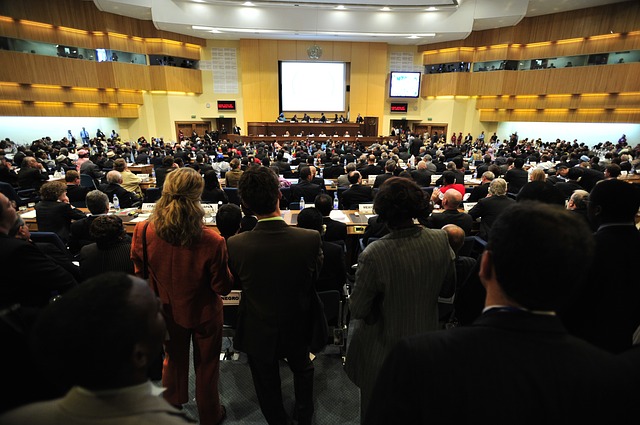 Guest post
Guest post
by Marian D. Schwartz
If you’re looking for a writers’ conference and you’re an indie, there are more conferences focusing on your interests today than there were when I last posted about conferences on Indies Unlimited in 2013. Well over 200 writers’ conferences will be held in the United States in 2019.
Your choices are broader if you want to attend workshops and lectures on the craft of writing than they are if you’re a self-published author who is specifically looking for ideas that will help you successfully market your books. There is no reason why a writers’ conference can’t offer workshops in craft and in self-publishing. Some offer a good balance in both, but many of them are tilted more toward one choice than the other.
Home pages can be misleading: It’s the schedule that counts.
While some conferences mention self-publishing on their home pages, they place an emphasis on agents and pitching sessions. This approach is a clue that a conference might not have what an indie is looking for. When I read about Workshops, Panels & Appointments on the home page of a well-known conference several years ago, marketing, ebooks and self-publishing were specifically mentioned. But when I clicked on the conference schedule, there wasn’t one workshop devoted to self-publishing.
Although it is early for some conferences to post their new schedules, many conferences have links on their home pages to their schedules from last year, which will give you a good idea of what they may be offering.
Indie conferences devoted to self-publishing and marketing are in such demand that Sell More Books Show is already sold out.
Look for your genre.
Do you write science fiction? Thrillers? Romance? Look for conferences that specialize in your genre. The Romance Writers of America Conference has a tent large enough to welcome both traditionally published authors and indies.
If you write thrillers and you’re an indie, ThrillerFest would be a good choice if your primary interest in attending is in improving your craft. But if you want workshops on marketing and promotion, this might not be the conference for you. The emphasis is on craft, pitching, and agents.
Manuscripts
Conferences that offer individual manuscript critiques charge extra for them. They also set specific time limits — anywhere from 10 minutes to an hour — and require prior registration. Applicants are advised to apply well in advance because individual manuscript critiques fill up quickly.
I’m not sure how helpful these critiques are. I have had only one experience with an individual manuscript critique at a writers’ conference, and the experience has made me wary of them. I was told to change a novel from the first person to the third person. Fortunately, my novel was accepted by a New York publisher less than a month later. The change that was suggested would have ruined the book.

If submitting a manuscript is your primary reason for attending a writers’ conference, an alternative might be to hire an experienced freelance editor to help you. Your entire manuscript will be read instead of just a portion of it, and you will get one-on-one attention.
If you’re wondering where you can find a good editor, join KBoards Writers’ Café. After you join, you can go on Writers’ Café and start a new thread asking writers in your genre to recommend editors they have used and been satisfied with. The writers on the forum are generous with their help. (Or you can check Indies Unlimited’s resource page about editing here.)
Pitching to literary agents
Every year more conferences are offering pitching sessions in which conference attendees pay extra to pitch their books to agents. These sessions are tense. Do they work?
In her article, “Are Writing Conferences Worth It?” J.H. Moncrieff wrote about her experiences pitching for agents at conferences she attended here. After giving her reasons, she concluded that pitching sessions are a waste of time.
Occasionally writers get agents at writers’ conferences, but it doesn’t happen often. Although some conferences have the happy faces of writers who found agents on their homepages, they offer no statistics. If getting an agent is your primary purpose for attending a writers’ conference, you are setting yourself up for disappointment.
In a study I performed on the odds of getting an agent at a conference, I found that: “At the present time it is impossible to know what the odds are for writers pitching for agents at conferences. If a conference has three hundred fifty aspiring writers pitching and five percent of them are successful, seventeen would have found agents. But when conference web pages are using testimonials that are ten years old from authors who have successfully pitched, perhaps the odds are more like two percent, which I suspect is a more accurate figure.”
Reason to attend a conference

Elise Blackwell went from being skeptical about conferences to endorsing them, with some reservations. Like many other writers, she is enthusiastic about the friendships writers can make. It’s valuable to get to know people who are in the same place you’re in. These friendships can last a lifetime.
Writers go to conferences to renew old friendships and to make new ones. They write blurbs for each other’s books and share helpful information. It is also an opportunity for them to talk to agents and publishers.
Be a smart shopper.
Be wary when you are reading a blog post extolling the benefits of attending writing conferences. If you find a pitch to attend a specific conference toward the end of the article, the author had an agenda. I’ve encountered this often. In today’s publishing world, new enterprises are started every day that try to make money by selling something to writers — promotional sites, courses on becoming a best-selling author, promises of effective marketing management, etc. Writers’ conferences are no exception. They are competing with each other, and they are charging for extras wherever they can. Compare the faculty, the schedule, the facilities, and the travel and housing expenses when you shop.
One more thing
There is no way to say this tactfully: not all conferences look favorably upon self-published authors. Several years ago, an award-winning self-published writer of science fiction posted on KBoards Writers’ Café about the literary snobbery he encountered at some writers’ conferences he attended. The snobbery stung. Unfortunately, this happens.
Self-published writers will probably not feel welcome at conferences like Bread Loaf and Sewanee. There are a number of lesser-known conferences where self-published writers will encounter the same attitude. These conferences focus on writers who want to be trade published. If you are self-published or planning to be self-published, you need to do your homework to avoid putting yourself in a situation where you would feel uncomfortable.
You can find writers’ conferences for indies here. Happy hunting!
 Marian D. Schwartz is the author of The Writers’ Conference: A Novel. Her observations at a writers’ conference made such a strong impression that she realized she had the seeds of a story. Learn more about Marian on her Author Central page.
Marian D. Schwartz is the author of The Writers’ Conference: A Novel. Her observations at a writers’ conference made such a strong impression that she realized she had the seeds of a story. Learn more about Marian on her Author Central page.

Great article, Marian. I totally agree with you. There are some smaller, local conferences that are more affordable for writers that have quality presenters from which good lessons may be learned. Otherwise, I also believe networking is the main reason to attend. Thanks for sharing your article.
I believe networking is the primary reason the “bigwigs” at the conferences attend. We can learn from them.
I was surprised at how many writers who teach at conferences acknowledged that a main reason for going was networking. There is a good lesson in this.
Great advice, thank you!
You’re welcome!
Great post Marian. I’d like to add to your list of conferences that offer indie publishing workshops and more. JP McLean, author of a fantasy / thriller series and I, who’ve written different genres, are presenting Indie-Publishing 101 at the Creative Ink Writers and Readers Conference in Burnaby, British Columbia this coming weekend, March 29-31st. What’s especially wonderful about this conference is its affordability.
I just came back from attending the San Miguel de Allende Writers Conference in Mexico and fabulous as it was, it was not inexpensive. So, as you say, Happy Hunting!
I’m surprised that a conference in Mexico was expensive. There is no question that conferences are moneymakers.
I’m glad your forthcoming conference is affordable. We need more of those.
About those “craft-and-pitch” workshops and conferences where the agents and editors request every pitch and then don’t respond at all, not even a form rejection. (JH Moncrieff noticed the same thing about them as I did.) It’s called Casper’s Law (named after the friendly ghost of yore): “The more enthusiastic the publishing professional you met at the conference, the more likely they are to ghost you rather than formally reject you because they feel really, really bad that they led you on.”
Amen.
I’ve never heard of Casper’s Law. What a great name for it! Thanks for sharing. I do wonder if they really feel that bad for leading people on. I read about so much of it going on that it has become a common practice. I believe they just think it comes with the territory.
Did you know that you linked to a post from last March? Nearly all of the listed conferences have already occurred.
Hi Nate, there are 2019 conferences listed near the bottom.
Thanks for the informative blog which left me wondering about the finances of attending a conference. What are author’s experiences of selling books at one? Conference expenses are not simple conference fee but travel and accomodation too. So selling books could help defray costs. Or should one not expect to sell much?
DH Smith
The only sales of books that I’m aware of at writers’ conferences are sales of books written by writers on the teaching staff. I’m unaware of opportunities for self-published writers to sell their books at writers’ conferences. Perhaps someone knows of conferences that allow it. Frankly, I wouldn’t wouldn’t expect to sell much if it were permitted.
You’re right about travel and accommodation costs: they add up and should be figured into the cost of attending.
For some reason I have been unable to respond to comments. There must be a glitch somewhere (I’ve been told that Mercury is in retrograde now, which means that electronics can get screwy). I hope this is corrected so I can read your comments and respond. I appreciate the time you took. Thank you!
Hi Marian, I’m seeing your replies – are you not?
Finally, I can leave replies!
I think the issue there was that comment was in moderation. Thanks for being so conscientious!